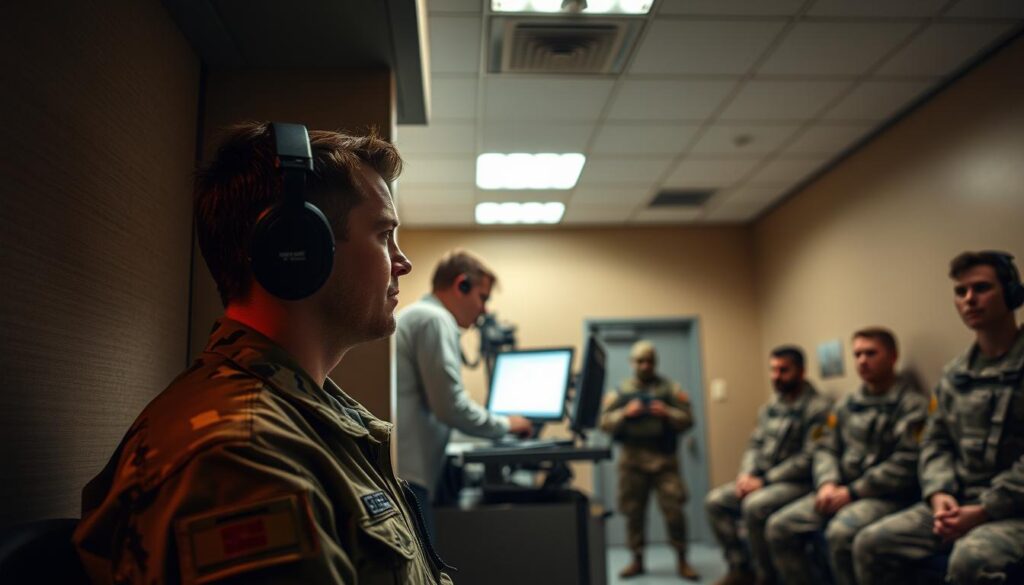Can a Soldier’s ability to hear and communicate effectively impact their overall performance in the military? The answer lies in understanding the importance of military hearing standards.
The Department of the Army Pamphlet 40-501 outlines the Army Hearing Program. It aims to maximize Soldier and DA Civilian hearing and communication abilities. Effective hearing conservation is key to maintaining military readiness.
The Army Hearing Program ensures Soldiers can perform their duties well. It also protects their hearing abilities. By understanding the Army hearing requirements, Soldiers can take steps to save their hearing and stay ready.
Key Takeaways
- The Army Hearing Program aims to maximize Soldier and DA Civilian hearing and communication abilities.
- Effective hearing conservation is crucial for maintaining military readiness.
- Understanding military hearing standards is essential for Soldiers to perform their duties effectively.
- The Department of the Army Pamphlet 40-501 outlines the Army Hearing Program.
- Soldiers can take proactive steps to conserve their hearing and maintain their overall readiness.
Overview of Army Hearing Requirements
Soldiers need their hearing to follow orders, spot dangers, and stay safe. Good hearing is key for them to do their jobs well and safely.
Importance of Hearing in Military Service
Hearing is vital in the military. It helps soldiers hear orders, find threats, and talk to their team. Clear hearing can mean the difference between life and death in battle.
According to Audiology Online, hearing loss and tinnitus are big reasons for military disability claims.
Noise exposure is a main cause of hearing loss in the military. It comes from weapons, explosives, and plane noise. To prevent hearing loss, the military uses personal protective equipment like earplugs and earmuffs.
Consequences of Hearing Loss
Hearing loss can greatly affect soldiers. It can make them less effective in combat, increase injury or death risk, and lower quality of life. It also makes it hard for them to communicate, follow orders, and spot dangers.
The effects of hearing loss can last a long time, sometimes forever. The military knows how important hearing is. They have programs to stop hearing loss and help soldiers who have lost their hearing.
Standards for Hearing Testing
The Army has strict rules for hearing tests. The Department of Defense Instruction 6055.12 sets these rules. It covers how to test hearing and the levels used.
Audiometric Testing Procedures
Audiometric testing is key in the Army’s hearing protection. It involves tests to check how well someone can hear different sounds and volumes. These tests are done in a quiet room to avoid outside noise.
The tests include pure-tone audiometry, speech audiometry, and tympanometry. Pure-tone audiometry checks the lowest sounds a person can hear. Speech audiometry looks at how well someone can understand speech at different volumes.

Frequency and Intensity Levels
The Army’s hearing tests cover certain sound levels and frequencies. They test sounds from 250 Hz to 8000 Hz, measured in decibels (dB).
These specific levels help find hearing problems. For example, trouble hearing sounds above 4000 Hz can be a sign of hearing loss from loud noises. By testing across different sound levels and frequencies, doctors can spot hearing issues and suggest treatments.
Hearing Eligibility Criteria
The Army has set hearing standards to make sure everyone can do their job well. These standards check if someone can hear well enough for military work.
General Hearing Capability Standards
The Army Pamphlet 40-501 explains the hearing standards for Army people. It talks about audiometric average threshold requirements to check hearing. These standards help ensure people can talk and listen in different places.
The hearing standards are as follows:
- Audiometric testing: People must take hearing tests to check their hearing.
- Hearing threshold levels: The Army sets hearing levels that people must meet to join.
Specific Threshold Requirements
The Army has specific threshold requirements for hearing. These are to see if someone is eligible for service. The requirements include:
- Frequency range: People must hear sounds in a certain range.
- Intensity levels: The Army sets levels of loudness that people must hear.
These standards help figure out if someone can join the Army. They check if someone can hear well enough for military work.
The hearing test is key to seeing if someone can join the Army. It makes sure people can do their jobs well and safely.
Hearing Waivers in the Army
The Army checks hearing waivers based on the type of hearing loss and the job the person wants. This is key to see if someone with hearing issues can do their job well.
Process for Requesting a Waiver
To get a hearing waiver, you must first have a hearing test. This test checks how well you can hear. A doctor then looks at the test results to decide if you can get a waiver.
You need to apply for the waiver and send in your test results. The Army looks at each case carefully. They consider what job you’re applying for.
Factors Considered for Approval
Dr. David Chandler says waivers are based on the type and severity of hearing loss. They also look at the job you want. They check if your hearing loss would affect your work.
They look at several things. This includes the type of hearing loss, how bad it is, and how it affects talking and listening.
| Factor | Description | Consideration for Waiver |
|---|---|---|
| Type of Hearing Loss | Sensorineural, conductive, or mixed | Sensorineural loss may be considered for waiver if not severe |
| Severity of Loss | Mild, moderate, severe, or profound | Mild to moderate loss may be considered for certain roles |
| Military Job Requirements | Communication needs, auditory demands | Jobs with lower auditory demands may be more likely for waiver approval |

The Army’s hearing waiver process aims to find a balance. They want to make sure communication and safety are good. At the same time, they want to let people serve who want to.
Common Hearing Disorders in Service Members
The military environment is tough on service members’ hearing. They face many dangers, from artillery fire to aircraft sounds. These noises can harm their hearing forever.
“Noise-induced hearing loss is a big problem for military people,” says the Department of Veterans Affairs. They stress the need for hearing conservation efforts.
Types of Hearing Loss
Service members can get different kinds of hearing loss. Sensorineural hearing loss is the most common from noise.
This type of hearing loss happens when the inner ear or auditory nerve gets damaged. It’s often from being too close to loud noises, like in combat or training.
Causes of Hearing Impairment in the Military
The Department of the Army Pamphlet 40-501 says noise-induced hearing loss is a big risk. It comes from loud noises. Other things that can hurt hearing include:
- Exposure to explosive blasts
- Prolonged exposure to loud machinery or equipment
- Combat-related injuries
It’s key to use combat ear protection guidelines to prevent hearing loss. This means wearing earplugs, earmuffs, and other gear to protect hearing.
Knowing about hearing loss helps the military prevent it. They can make plans to keep service members’ hearing safe.
Prevention of Hearing Damage
Hearing loss is a big worry in the military because of loud noises in combat and training. The Army is working hard to keep soldiers’ ears safe. They want to stop long-term hearing damage.
Protective Measures for Soldiers
Soldiers get hearing protection devices like earplugs and earmuffs. These are for use during training and combat. They help block out loud sounds to protect the ears.
- Disposable foam earplugs are easy to use and very effective.
- Custom-made earplugs fit better for soldiers who need them.
- Earmuffs are used when the noise is too loud, like during artillery firing.
Role of Hearing Conservation Programs
The Army’s Hearing Conservation Program is key to stopping hearing loss. It includes:
- Regular hearing tests to check soldiers’ hearing.
- Education and training on why hearing protection is important and how to use it right.
- Finding and fixing noise hazards to lower exposure.
The Army’s Hearing Program says, “Hearing conservation is everyone’s job, from commanders to soldiers.” This shows we all need to work together to protect hearing.
By using protective gear and strong hearing conservation programs, the Army hopes to cut down hearing loss. This improves soldiers’ lives and keeps them ready for duty.
Rehabilitation Resources for Affected Soldiers
The Army has special resources for soldiers with hearing problems. The Army Audiology & Speech Center offers many services. These help with communication disorders.
Available Treatment Options
The Army has different treatments for hearing loss. Soldiers get audiological evaluations to check their hearing. They also get communication therapy to improve their skills.
Some treatments include:
- Hearing aids and assistive listening devices
- Cochlear implants for severe hearing loss
- Auditory training programs to enhance hearing and communication
Support Services Offered by the Army
The Army also offers support for soldiers with hearing loss. This includes:
- Counseling and mental health support
- Vocational rehabilitation to help soldiers adapt
- Support groups for soldiers and their families
The hearing evaluation process is key in the Army’s services. It helps find out the extent and type of hearing loss. This guides the treatment plan.
The Army’s comprehensive resources help soldiers with hearing loss. They ensure soldiers can keep serving effectively.
Future Trends in Army Hearing Requirements
The Army is always updating its hearing standards to help its soldiers. With new tech coming out, they’re making new rules to keep ears safe and fix hearing problems.
Advancements in Hearing Technology
The Department of Defense Hearing Center of Excellence is leading the way in hearing tech. They’re working hard to find new ways to prevent hearing loss in the military. These new tools will help shape the military hearing standards and Army hearing requirements of the future.
Evolving Standards and Procedures
As we learn more about hearing loss, the Army’s rules will change too. They want to make sure soldiers get the best care for their ears. By keeping up with the latest in hearing tech, the Army can keep its soldiers safe and ready for duty.


